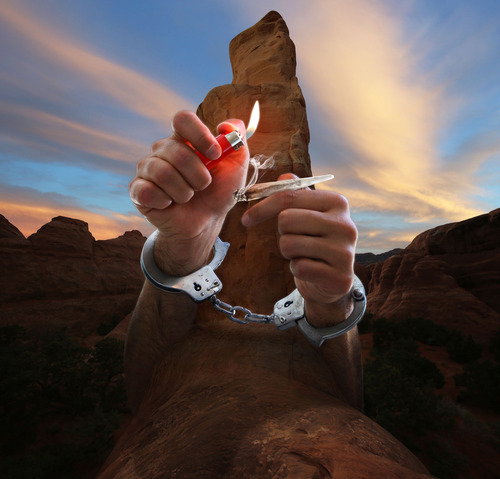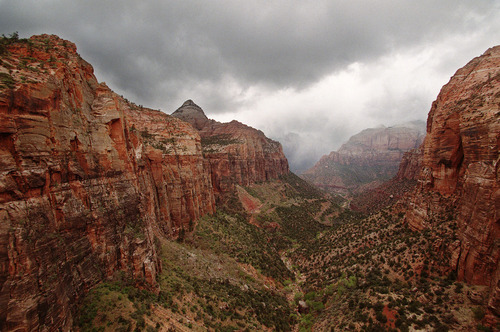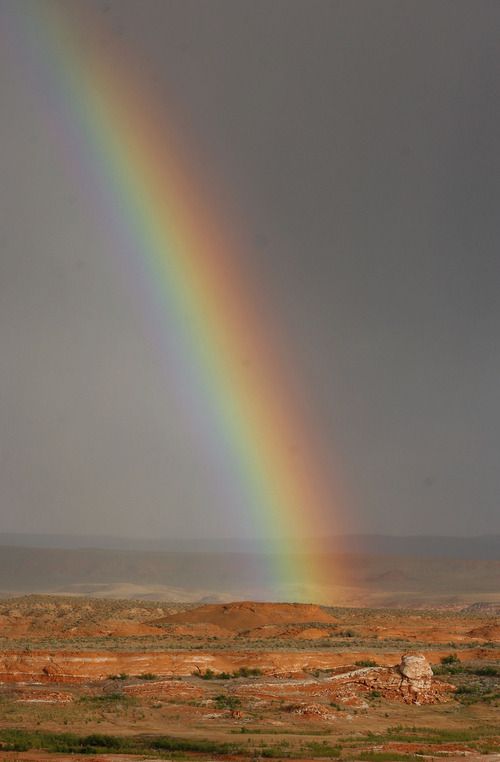This is an archived article that was published on sltrib.com in 2013, and information in the article may be outdated. It is provided only for personal research purposes and may not be reprinted.
It was nearly midnight and the two young men were playing cribbage at a picnic table at their campsite in Zion National Park when one pulled out a pipe filled with marijuana, lit it and took a puff.
The pipe passed across the table and the other young man inhaled deeply, then handed it back. Suddenly, a loud rustling came from some nearby bushes.
"We were truly scared because we thought it was a wild animal," said one man, 23, who agreed to be interviewed only if not identified.
It turned out to be a park ranger, soon joined by another ranger who pulled up to the campsite in a vehicle with lights flashing.
For 90 minutes last September, the two Maine residents, on their first trip to Utah, stood by as the rangers searched their tent, vehicle and possessions for drugs. The rangers found only the pot that had been on the table — less than a gram, the equivalent of two joints. Each man received a federal class A misdemeanor citation for simple possession of a controlled substance.
The two men were among 165 people charged with simple possession on public lands in Utah last year, according to court filings in U.S. District Court for Utah. The vast majority — 145 people — were cited for marijuana; others were caught with drugs such as methamphetamine, hallucinogenic mushrooms, cocaine and prescription medication. About half live in other states, and most were college-age young men, who, as St. George attorney Aric Cramer puts it, "come on vacation and leave on probation."
"Frankly, this is just a waste of resources," Cramer said. "There are so many things park rangers could be doing, like helping people rather than crawling around on their bellies with night-vision goggles to catch people who are puffing on a joint — especially now when we are in a sequester, where federal budgets are rather thin."
In fact, Utah led the country last year in simple possession convictions on federal land, according to the Transactional Records Access Clearinghouse (TRAC) at Syracuse University. Using Justice Department data, the clearinghouse found Utah's federal court processed about a third of the 465 convictions lodged across the nation. Utah also ranked first in 2011. The TRAC figures are not broken down by drug type.
The District of Eastern Virginia, with 79 convictions, was second while the Western District of Texas was third with 61 convictions.
About a third of the convictions nationally were in cases brought by the Interior Department, which includes the National Park Service and Bureau of Land Management. The Agriculture Department, which oversees the U.S. Forest Service, accounted for 19 percent of the convictions, according to the clearinghouse. In Utah, the Park Service accounted for most case filings last year, with the Forest Service close behind.
"It is not surprising that Utah would lead the nation in this area, given the significant amount of federal land in our state," David Barlow, U.S. attorney for Utah, said in an email. "While some states have federal land that is not used for recreation, much of Utah's federal property — our national forests, national parks and monuments, recreation areas and public lands — is used by Utah residents and visitors to our state."
Places in Utah where people were cited most often include Zion National Park, Glen Canyon National Recreation Area and the Diamond Fork hot springs in the Uinta-Wasatch-Cache National Forest. Citations issued by rangers at Zion accounted for about half the simple possession cases involving Utah's national parks last year.
"Controlled substances are illegal, period," said Cindy Purcell, chief ranger at Zion. "If we were in a state like Colorado or California, where the state has legalized it, it would still be illegal on federal property. We are federal officers and that's our mandate. We enforce the federal law."
—
Conflicting laws • The Pew Research Center reported in April that for the first time in four decades of polling, a majority of Americans favor legalizing marijuana use and an even greater percentage — 72 percent — say government efforts to enforce pot laws cost more than they are worth.
Eighteen states and the District of Columbia have made medical use of marijuana legal; two of those states — Colorado and Washington — also allow recreational use by adults age 21 and older. Fifteen states have decriminalized simple possession of marijuana. Six states are considering laws that would make medical use of marijuana legal, according to Norml.com, an advocacy group focused on reforming pot laws.
President Barack Obama acknowledged last year that shifting state laws on marijuana have created a dilemma for the federal government: "How do you reconcile a federal law that still says marijuana is a federal offense and state laws that say that it's legal?" he told ABC.
The Obama administration holds firm to the position that legalization of marijuana runs counter to public health and safety, but makes it clear that limited federal drug enforcement resources will not be aimed at individual users — a stance reiterated in April in a report by the Congressional Research Service on the growing conflict between state and federal laws on marijuana use.
However, the report also cited a 2011 Justice Department memorandum to prosecutors that said even in states that have legalized the drug, "persons who are in the business of cultivating, selling or distributing marijuana, and those who knowingly facilitate such activities, are in violation of the [Controlled Substances Act]. ... Consistent with resource constraints and the discretion you may exercise in your district, such persons are subject to federal enforcement action, including potential prosecution."
Barlow said his office heeds those guidelines.
"The priority focus in the U.S. attorney's office in Utah is prosecuting complex narcotics cases involving the manufacturing, trafficking and distribution of controlled substances," Barlow said. "We have also focused resources on prosecuting physicians who have prescribed controlled substances to patients outside the usual course of medical practice or without a legitimate medical purpose."
Each summer, significant local, state and federal resources are devoted to investigating and prosecuting individuals involved in large marijuana grows on public lands — many with ties to Mexican drug cartels, Barlow said. Various prosecutors handle the simple possession cases, he added.
"We encourage visitors to come to Utah and enjoy our beautiful federal lands," Barlow said. "They should remember, however, that possession of a controlled substance is a violation of federal law regardless of where they live and a violation of state law in Utah."
Several resolutions introduced in Congress would either end the federal prohibition or align federal law with state laws that allow marijuana use. (In Utah, lawmakers have never even broached the subject of medical use of marijuana.) But the patchwork of policies may be creating public confusion.
"I don't know that the average person going into a national park or federal land is thinking they are going into another world of jurisdiction," said Ben Hamilton, an assistant Utah federal public defender. "They are not thinking about what jurisdiction they might be in and, especially with marijuana laws in other states, they get this attitude it's OK and it's not against the law ... especially the people from out of state. They think, 'Yeah, I got some weed on me, big deal.' But you're not in Colorado with a state police officer. You're in Utah with a federal police officer, where it is going to be taken seriously."
—
'Doesn't seem justified' • People cited in Utah for simple possession learn that having even a small amount of pot on federal land can be a costly, time-consuming and potentially life-changing mistake.
The penalty for simple possession is up to a year in prison and a minimum fine of $1,000, or both. A defendant is eligible for a probation order that suspends a judgment of conviction if the citation is his or her first federal or state drug offense and first time on probation. In Utah, court records show most defendants go that route and enter a guilty plea, pay a fine and get a year of supervised probation.
"Usually, these folks just want to get it done as quickly as possible," Cramer said, "and get on with their lives and never come back [to Utah]."
They also agree to random drug testing and are restricted from traveling outside the country and, sometimes, their home state. In all, court fees alone total $1,140. There may be travel costs since those accused of the crime must appear in court in either Salt Lake City, Moab or St. George. Some defendants opt to represent themselves but most are defended by private attorneys or public defenders.
"I understand it is against the law, that I was breaking the law and deserved some repercussions," said the busted Maine resident, "but the sentence outweighed the crime."
He will complete his probation in December after spending more than $2,000 on fines and attorney fees. In addition to travel restrictions and random mandatory drug tests, he also is "super careful about who I am around" to avoid getting cited for a probation violation.
"It is something I now have to think about every day of my life and be very cautious," he said. "Considering what I did, it doesn't seem justified. I understand the fine, a stern talking to and maybe a class like you go through for a DUI, but a year of probation? That is what [is given] to an actual felon when he gets out of jail. I find it appalling."
Except in the case of a minor, the misdemeanor citation can never be expunged from an individual's criminal history — even if probation is completed — which means it will forever show up as an arrest and dismissal.
If a defendant fails a drug test or violates other terms of probation, the supervised release may be extended or a judgment of conviction entered on his or her record. A second offense triggers a mandatory fine of $2,500 and a minimum prison term of 15 days and up to two years.
For some young offenders, working to pay off attorney and court fees can pose a challenge, one that makes them vulnerable to defaulting and ending up with a conviction.
In March, a 20-year-old Colorado man and several friends spent spring break in Moab. They arrived in the evening and camped on BLM land just outside town, with no one else in sight. As they sat around a campfire, two BLM officers drove up and said they had heard fireworks being shot off in the area.
"We hadn't heard anything," the college student said. Nor did his group have any fireworks.
The officers asked if they could search the campsite and, after one of the man's friends said yes, began looking around. The officers spotted a pipe and then asked the campers if they had "weed."
The young man, who also agreed to be interviewed by The Salt Lake Tribune only if not identified, claimed ownership of a small canister that contained about $10 worth of marijuana. Another individual had a medical license for marijuana and told the officers he had a small amount in his vehicle.
"We were all scared," he said. "We were getting flashlights shined in our eyes and everyone was freaked out. I was thinking, 'This sucks,' because we were probably going to jail and had a tiny amount, which isn't even an offense in Colorado. I didn't realize when you are going on federal land and in a different state what could happen."
The man and his fellow campers ended what was to be a five-day visit to Moab the next morning and returned to Colorado to let their parents know what had happened. He has hired an attorney in Utah and taken on extra work to earn the money to pay what he expects will be $3,000 in fees and fines.
"I'm pretty flat broke right now as it is, so it is hard to come up with this kind of money," he said. "It kind of sucks that we were in the wrong state. We shouldn't have brought anything with us. It is kind of a bummer we live in Colorado and there are such harsh penalties three hours away."
brooke@sltrib.comTwitter: @Brooke4Trib Drugs on federal lands: Wild West
According to National Park Service data, the Pacific West Region — Hawaii, California, Washington, Oregon, Idaho, Nevada and part of Montana — logged 1,550 drug cases in 2012. The Intermountain Region — Utah, Arizona, Texas, New Mexico, Oklahoma, Colorado, Wyoming and parts of Montana — tallied 941.







